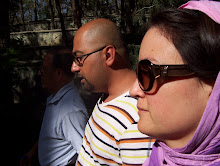Ali Shariati, arguably one of the most important ideologues of the 1979 Iranian revolution, once stated that Iran's Shii political tradition is predicated on the word "no." He invoked the beginnings of the Shi'a-Sunni disagreement when the family of Ali, the seventh-century fourth caliph and cousin of the Prophet Muhammad, was surreptitiously denied successorship of the Muslim community. Social justice, therefore, was every Muslim's right, and the refusal to accept corrupt authority was an obligation.
Today's protests are not rooted in religion per se but the politics of "no"--no to trumped-up election results, no to top-down authority, no to cronyism, no to state-enforced morality. Shariati's ghost haunts the current government because the country now boasts a one-hundred-year tradition of populist uprisings.
In the twentieth century, Iranians fought for change from every corner of society, from the streets to the pulpit, the local coffeehouse to the coffeehouses of Europe. The Constitutional Revolution of 1905, Mossadegh's nationalist moment (before the U.S. and British -backed coup of 1953), and the 1979 revolution were all protest movements with a formidable populist base. In every above instance including the current uprising--which Hamid Dabashi has rightly called a "civil rights movement" and not a revolution--societal forces across gender, class and ethnic lines have sprightly mobilized against autocratic government. (The byword of the constitutional revolution, in fact, was "anti-depotism" (zed-e estebdad)).
From the vantage point of history's longue durée, the thirty-year time lapse between 1979 and now is relatively short. The fact that we see two major social upheavals within this period is a testament to the political gumption of two main demographics--the post-WWII generation, and now the post-1979, post-Iran-Iraq war baby boomers. The latter group has been weened on the memory and political symbolism of their parent's coup, and though many including myself underestimated their frustrations as youthful angst, recent events show they have reached a high level of political maturity. Though still in a process of defining themselves, they have appropriated the 1979 generation's playbook, using anti-Shah slogans ("Death to the dictator!"), nighttime ritual chants on rooftops ("Allahu Akbar!"), coming out in vast numbers at memorial gatherings, and even practical knowledge such as how to puncture the motorcycle tires of militia groups.
The heroic participation of Iranians citizens in their political fate embodies the audacity of nope. More importantly, today's grassroots movement appears de-centered. Whereas in '79 Ayatollah Khomeini was the preeminent refusenik, today's symbolic icon is an innocent by-standard known simply as "Neda." The new face of protest is not a Khomeini or even a Moussavi, but an ordinary young woman. These days I throw caution to the wind, so at the risk of sounding overly romantic, let me just say that while you can remove Moussavi, there will be a million Nedas to rise up and take his place.
Iranians have risen time and again to demonstrate what they don't want. Now the world awaits a clear picture of what it is they do. For now, their refusal is, as a colleague put it, a "manifestation of change itself."
Friday, July 10, 2009
Subscribe to:
Posts (Atom)
